
F-1 Visa
An F-1 visa is issued by the U.S. government to non-immigrant students for the sole purpose of studying in the U.S. Check out the International Student Life Cycle.
Due to extended visa processing times, we suggest you start this process right away.
Step 1: Apply for admission to SBCC.
Step 2. Pay the SEVIS I-901 fee for the SEVIS ID number after you receive an acceptance letter and I-20.
Your SEVIS ID is on your SBCC I-20 and begins with "N0". The SBCC SEVIS School Code is: LOS214F00359000
Step 3: Visit the U.S. Dept of State to review the steps of the F-1 visa application process. The visa application title is "DS-160". Tips:
- The forms asks for a U.S. address, and two U.S.-based contacts. You may use SBCC's address and the names/contact for your International Advisor and International Programs Director.
- After you complete the form, check your responses for accuracy very carefully. Pirnt a copy of your application. You will not be able to refer back to the online version.
Step 4. Apply for your F-1 visa. Check out: and Global wait times
- Visa wait times-by city and Visa wait times-all cities
- Visa interview waiver eligibility requirements
- Frequently Asked Questions - Check out the FAQ's to learn about F-1 visa rules and benefits.
- Canadian citizens do not need to apply for an F-1 visa. F-1 status is granted at the port of entry.
It is important to remember that applying early and providing the requested documents does not guarantee that the student will receive a visa. Each student's personal and academic situation is different. Two students applying for same visa may be asked different questions and be required to submit different documents. The guidelines and instructions given on our website are general, and requirements may vary from one US embassy or consulate to another.
The Right Attitude - In addition to providing the right documents and having the right reasons, making the right impression on the consular officer is equally important in the visa application process. Here are some interviewing techniques suggested by NAFSA:
Be Honest - Discrepancies between your written and verbal answers will likely result in a denial at worst, or a delay at least. Be forthcoming and clear about your intentions, background, ties to home country, study plan, etc.
Speak in English - Practice interviewing in English with a native English speaker. Being fluent and confident will help you present your case better. However, avoid preparing a speech.
Speak for yourself - Make your case by yourself. Having your parents or others speak on your behalf does not make a good impression on the consular officer.
Be brief - Keep your answers and explanations short and to the point, as consular officers can generally only spend a few minutes with each applicant.
Be positive - Do not argue with the consular officer or come across as rude and sarcastic; even if you are denied a visa. Instead politely ask the officer to suggest additional documents you can bring in order to overcome the visa denial.
Occasionally students are denied the visa. The most common reason for denials is on the basis of Section 214(b) of the Immigration and Nationality Act (INA) if the consular officer is not sufficiently convinced of the student's intentions to return to his/her home country after completing their studies. Applicants should be prepared to prove beyond doubt their "permanent residence" in, and "strong ties" to their home country. Fortunately, a visa denial is not permanent and can be reversed if the student can show new, incontrovertible evidence.
Some tips on how to demonstrate your intentions to return to your home country:
- Convince the consular officer that the sole (not just "primary") purpose of your visit to the US is to pursue a program of study
- Clearly & concisely describe what you plan to do after you complete your education and return to your country
- Document family ties, business interests, and assets in your home country
- Discuss your job prospects in your native country upon completion of your US education
